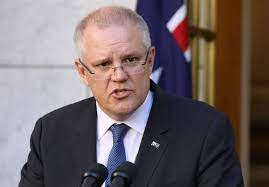Prime Minister Scott Morrison says Solomon Islands knows Australia is a “great friend” as he defended his government’s response over the Pacific Island nation’s security deal with China, which Labor has labelled a significant policy failure.
Australia has raised concerns and disappointment at the signing of the deal,
While campaigning in south-east Queensland on Wednesday, Anthony Albanese joined Labor’s foreign affairs spokesperson Penny Wong in labelling the deal a “massive foreign policy failure on the prime minister’s watch”.
“Australia needs to do more than step up with the slogan in the Pacific, it needs to step up with real engagement, deep engagement, with our Pacific island neighbours,” he said.
Speaking in the ultra-marginal seat of Boothby in Adelaide, “Morrison defended the government’s response to what is a “serious issue”, saying it works “respectfully” with Pacific Island nations.
He said he has spent “an enormous amount of time working with all the Pacific leaders” in recent years due to the real risk of “China seeking to interfere within our region” being exposed, but that diplomacy in the region cannot be heavy-handed.
“One of the things we strongly agree on in how we handle the issue within our Pacific family, we are siblings – there’s no children and adults in that relationship.
“We treat Pacific family as siblings and as family. Our view is we don’t go around stomping around telling leaders in Pacific islands what they should and shouldn’t do. You work with them respectfully and carefully.”
The prime minister said Australia will continue to work respectfully with Solomon Islands.
“All the way through, we work respectfully with these countries, and they know that Australia is a great friend.”
Earlier, Foreign Minister Marise Payne also said criticism of the government doesn’t recognise the “the sovereign decisions that governments make for themselves”.
“It also doesn’t recognise the strength and the engagement that Australia has made through the Pacific step up,” Senator Payne told the ABC.
“We are looking at very serious geostrategic challenges in our region.”
Labor has questioned the government’s decision to send Zed Seselja, Australia’s minister for international development and the Pacific,
“This deal between China and the Solomons was foreshadowed, foreshadowed last August, the government was warned. Yet, only in recent days did the government bother to send a junior person across to the Solomons,” Albanese said.
Morrison said sending the Pacific minister instead of the foreign minister was the right course of action.
“I’m very conscious of how visits are perceived within the Pacific. This was the right calibrated way to address this issue with the prime minister,” he said.
Morrison said he also sent senior members of the government’s national security officials team to Solomon Islands, along with other Pacific nations.
“I’m personally engaging with these leaders, constantly, and ensuring that we talk through the challenges that they have, particularly during the pandemic,” he said.
“We were the country that stepped up most for our Pacific family and reminded other large countries in the world about the needs in the Pacific.”
The prime minister said Labor has been “very passive” when it comes to the risk presented by China and the Pacific region.
It comes after Labor foreign affairs spokeswoman Penny Wong said a Chinese security agreement with a nation 1,600 kilometres from Cairns has made the region less secure under Morrison’s watch.
“This is the worst foreign policy blunder in the Pacific that Australia has seen since the end of World War II,” Senator Wong told the ABC on Wednesday.
“The risks that Australia faces have become much greater.
“The government should have acted sooner. What this deal signifies is that Australia is no longer for the Solomon Islands a nation to whom they turn to meet their challenges in every instance.”
When asked whether Australia’s standing in the Pacific had been diminished, with diplomatic concerns conveyed to Honiara ignored, Morrison said the pact underscores the pressure China places on Pacific nations as it tries to undermine security in the region.
“You can’t always be fully persuasive on these issues,” he said.
“Now with this arrangement, we need to ensure we work with them to see that Australia’s interests aren’t compromised … (and) that their strength and their sovereignty is not compromised by these types of arrangements.”
Morrison said the Solomon Islands government had stated it would not allow any Chinese naval bases.
“The prime minister of the Solomon Islands has made it very clear that they are not accepting of any base in the Solomon Islands,” he said.
“They are not. That there is no basis to make that assertion.”
Solomon Islands Prime Minister Manasseh Sogavare told the country’s parliament the agreement, centred on domestic security, was guided by the country’s national interest.
“Let me assure the people that we entered into an arrangement with China with our eyes wide open, guided by our national interests,” he said.
“We have full understanding of the fragility of peace and our duty as a state to protect all people, their property and critical national infrastructure of the country.”
Earlier, Foreign Minister Marise Payne expressed her deep disappointment in the signing of the security agreement, and said Australia remains concerned about the lack of transparency surrounding it.
“This has not been agreed in an open and transparent way – not being consulted, for example, across the region,” she said.
“Security issues have been dealt with in a Pacific-wide manner, that’s the traditional approach for these issues, and that’s why some Pacific partners have also raised concerns,” she said.
SOURCE: SBS/PACNEWS














